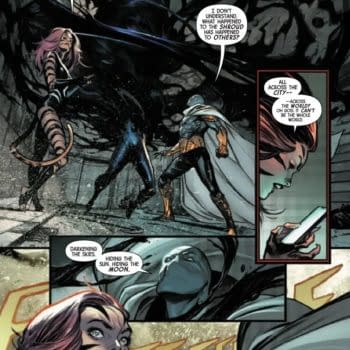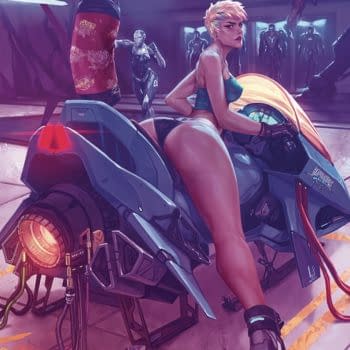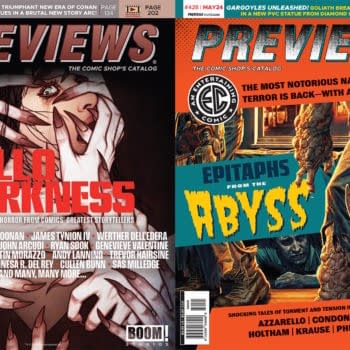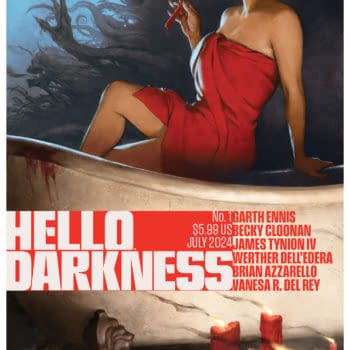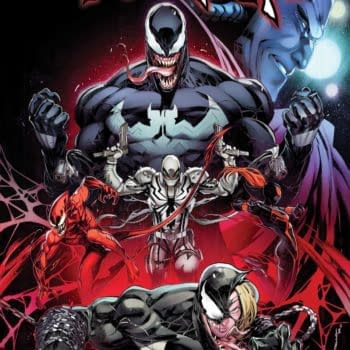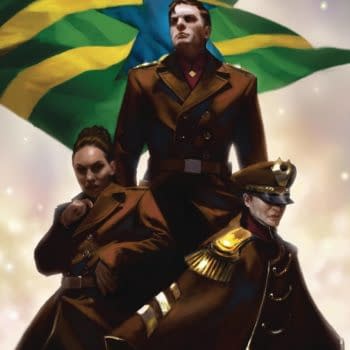Posted in: Comics, NYCC | Tagged: a k summers, Ariel Schrag, autobio comics, autobiography, carlo quispe, diversity, graphic novels, image comics, L. Nichols, lgbt, LGBTQ, Morgan Boecher, new york comic con, NYCC, NYCC 2015, prism, prism comics, queer press grant, Self-Obsessed, Sina grace, tara madison avery, tumblr, webcomics
Post NYCC – Prism Comics Presents: Autobio In Queer Comics
By Joe Glass

As such, I missed the first question and response from moderator Tara Madison Avery to L. Nichols on their work, Flocks, as I tried to get my devices working and ultimately caved for the good old fashioned pen and paper method. However, Flocks can be found at the links posted, along with the Grindstone Comics store where you can buy Nichols' comics. The art is fantastic and powerful as it explores growing up queer in the religious south of the USA.
Morgan Boecher's What's Normal Anyway? documents his transition in a 'one-step removed' style of autobiography. It shares details of female-to-male transition using the comic format and humor. Boecher felt the medium was perfect for being able to talk about that particular experience, as the visual nature of comics helps portray the physical visualization and changes.
Carlo Quispe discussed the political aspects he explores though comic strips, Uranus Comics…he felt the medium would allow him to discuss issues of the body politic, gender and race without the reader being immediately aware that that was happening.
A. K. Summers talked about Pregnant Butch, which looks at her experiences as someone who identifies with the 'lesbian butch' aesthetic going through pregnancy, and the very visual changes that causes as well. The comic deals with that experience but also ideas of defying gender norms and presentation. She felt that dealing with those aspects demanded the comic form.
Ariel Schrag started her work from her freshman year of high school. She discussed how making autobio comics can almost make you detached from your own life, as you start thinking 'How will I tell this in comics?' or 'how can I make this situation funnier/more poignant/express the emotion of it'.
Sina Grace talked about his auto-bio work, from Not my Bag, which documented working in a busy retail day job to the more recent Self-Obsessed out from Image. He talked about how it's not easy working a demanding day job and developing your creative identity – but you do it because you feel you need to. He also talked about how autobio can be very self-revelatory and total therapy, as you process experiences through creation.
It may be worth noting that I went to the Image booth after this panel to pick up Self-Obsessed too, but it was completely sold out. Make of that what you will.
The panelists then all discussed various ideas of the medium, such as how it's a great way to capturing moments forever, a snapshot not just of the experience, but of the emotion and feelings surrounding it. Comics as a medium is perfect for illustrating the internal and external of the experience.
One of the main challenges is the appearance of other people in the story, as whilst it is your story, inevitably other people are going to play a part in it. It can also be difficult to portray both sides in any situation too, and the panelists all seemed to agree you have to learn to manage your blindspots.
L. Nichols in particular has found the comics very useful in mending relationships with others too, as it can be used as a tool of finding connection and understanding, which Boecher agreed with, but also pointed out it can also lead to misunderstandings too.
The panel came to an end with the announcement of the Alphabet Anthology which will debut at Wonder Con. The anthology supports the Prism Comics Queer Press Grant, which is used to help queer creators and their projects in comics.
Joe Glass is a Bleeding Cool reporter and comics creator. His work includes the LGBTQ superhero team series The Pride, which was one of the Top 25 Comixology Submit Titles of 2014; and also co-writing Stiffs, a horror comedy series set in the South Wales valleys he calls home. All the comics are available on Comixology, or you can get them in print here and here.











